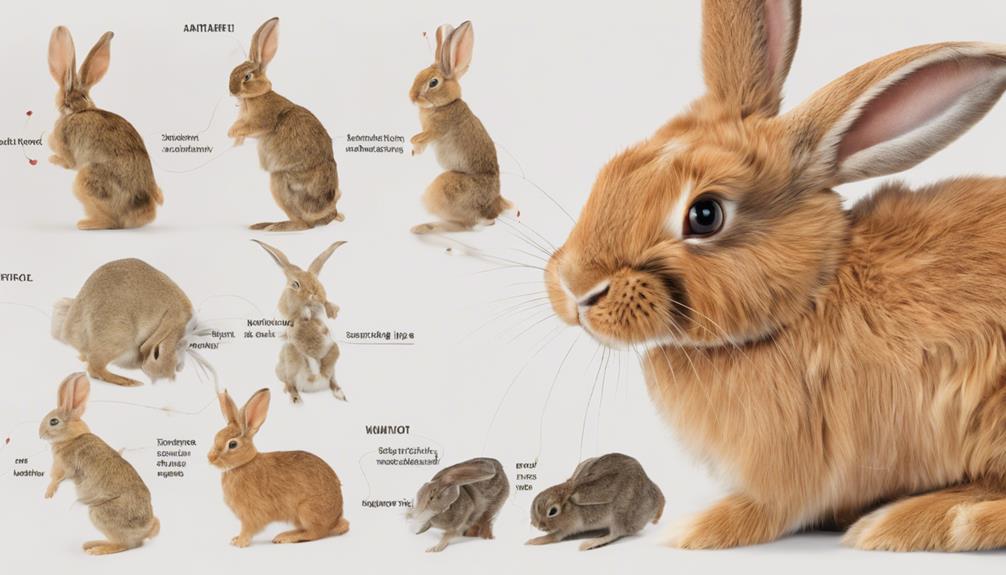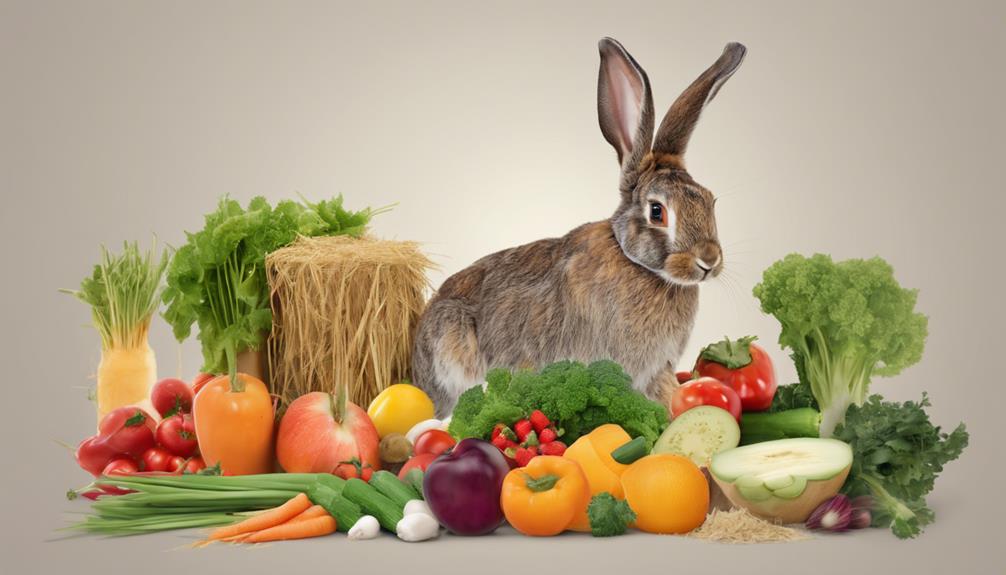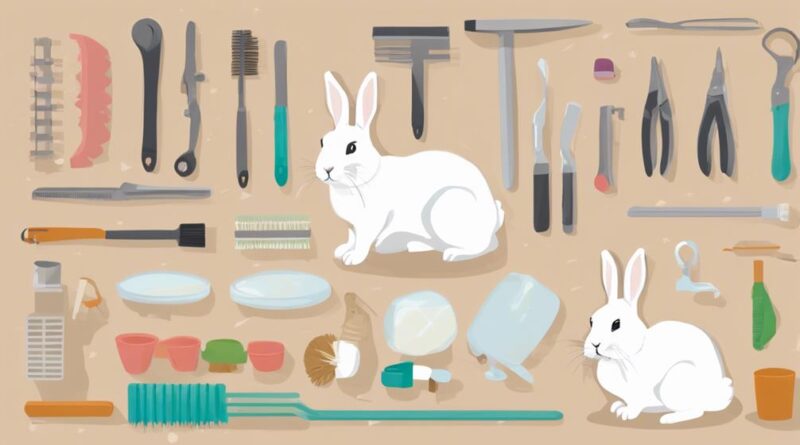Top 10 Hygiene Practices for Healthy Rabbits
To keep your rabbit healthy, follow these top 10 hygiene practices: Regularly groom your rabbit to prevent matting. Keep their living area clean and dry with proper bedding. Trim their nails carefully. Monitor dental health and clean their ears gently. Provide fresh water daily and a balanced diet. Schedule regular vet check-ups for optimal health. By following these practices, you ensure your rabbit's well-being and longevity. Further steps detailed in the research will help you provide the best care for your furry companion.
Regular Brushing and Grooming
Regularly brushing and grooming your rabbit is essential for maintaining their overall health and well-being. Not only does it keep their coat looking neat and tidy, but it also helps in preventing fur matting and maintaining coat health. Rabbits shed their fur regularly, and by grooming them consistently, you can help manage shedding patterns and reduce the amount of loose fur around your living space.
To prevent fur matting, it's crucial to brush your rabbit's fur at least once a week, depending on the breed and length of their coat. Long-haired rabbits may require more frequent grooming to prevent tangles and mats from forming. Use a soft brush or a comb specifically designed for rabbits to gently untangle any knots and remove loose fur. Regular grooming also helps to distribute natural oils throughout the coat, keeping it healthy and shiny.
When grooming your rabbit, pay attention to their shedding patterns. Most rabbits shed their fur every three months, with some breeds shedding more frequently. During shedding periods, increase the frequency of grooming sessions to help your rabbit get rid of excess fur and prevent hairballs. Consider using de-shedding tools like grooming gloves or brushes to help remove loose fur effectively without causing discomfort to your rabbit.
Clean and Dry Living Environment
Maintaining a clean and dry living environment for your rabbit is crucial for their health and well-being. Proper bedding maintenance is essential to prevent dampness, which can lead to various health issues. Regularly check and change the bedding in your rabbit's enclosure to keep it clean and dry. This simple step goes a long way in ensuring your rabbit's comfort and health. Additionally, effective odor control is vital for both you and your rabbit. Consider using bedding materials that help absorb odors and keep the living space smelling fresh.
Setting up a litter box in your rabbit's living area can help in maintaining cleanliness. Train your rabbit to use the litter box, making it easier to spot-clean and keep the rest of the enclosure tidy. Ensure the litter box is easily accessible and cleaned regularly to prevent any hygiene issues. Furthermore, providing a hay rack can help keep hay off the floor, reducing mess and making it easier to clean up.
Proper Nail Trimming
To ensure the health and comfort of your rabbit, proper nail trimming is essential in preventing issues such as overgrowth and potential injuries. Maintaining your rabbit's nail health is crucial for their overall well-being. Here are some tips on trimming techniques to keep your rabbit's nails in good shape:
- Regular Inspections: Check your rabbit's nails frequently to monitor their length. If you hear clicking sounds as they move around, it may be time for a trim.
- Use the Right Tools: Invest in quality nail clippers designed specifically for small animals. Avoid using human clippers as they can cause splintering or crushing of the nail.
- Proper Technique: When trimming, make sure to avoid cutting into the quick, which is the pink part of the nail containing nerves and blood vessels. Trim small amounts at a time to reduce the risk of injury.
- Seek Professional Assistance if Needed: If you're unsure about trimming your rabbit's nails or if your rabbit is particularly squirmy, consider seeking help from a veterinarian or a professional groomer experienced in handling rabbits.
Monitoring Dental Health
To ensure comprehensive care for your rabbit, another critical aspect to focus on is monitoring their dental health. Dental health is vital for rabbits as dental problems can lead to issues with eating and overall well-being. Regular dental exams by a veterinarian are essential to check for any signs of dental disease such as overgrown teeth, abscesses, or misalignments. These exams can help catch problems early before they escalate into more serious issues.
In addition to professional dental exams, you can also play a proactive role in maintaining your rabbit's dental health by incorporating tooth brushing into their grooming routine. Tooth brushing may sound unusual for a rabbit, but it can help prevent the buildup of plaque and tartar, which can contribute to dental problems. Use a small, soft toothbrush designed for pets and special pet toothpaste to gently clean your rabbit's teeth. It's important to introduce tooth brushing gradually and make it a positive experience for your rabbit.
Ear Cleaning
Regular ear cleaning is an important aspect of maintaining your rabbit's overall hygiene and health. Proper ear care can help prevent issues such as ear mites and infections, ensuring your rabbit's ears stay healthy.
Here are some essential tips for cleaning your rabbit's ears effectively:
- Regular Inspection: Check your rabbit's ears weekly for any signs of dirt, wax buildup, redness, or unusual discharge. Early detection can help prevent potential problems.
- Gentle Cleaning: Use a damp cotton ball or a soft cloth to gently wipe the outer surface of your rabbit's ears. Avoid inserting anything into the ear canal to prevent injury.
- Veterinary Guidance: If you notice any concerning symptoms like excessive scratching, head shaking, or foul odor coming from the ears, consult your veterinarian for proper diagnosis and treatment.
- Preventive Measures: To avoid ear mites, keep your rabbit's living area clean and dry. Regular grooming and maintaining a healthy environment can reduce the risk of ear-related issues.
Bathing When Necessary
When necessary, bathe your rabbit using gentle and appropriate techniques to maintain their hygiene effectively. Rabbits generally don't require frequent baths as they're skilled groomers themselves. However, there are instances where a bath is necessary, such as when dealing with flea prevention or addressing specific skin issues.
Before bathing your rabbit, ensure that the water temperature is lukewarm, as they're sensitive to extreme temperatures. Use a mild shampoo specifically formulated for rabbits or small animals to avoid skin irritation. Gently lather the shampoo and carefully rinse it off to prevent any residue from remaining on the skin.
When drying your rabbit, opt for a soft towel to gently pat them dry. Avoid using a hairdryer, as the noise and heat can stress your rabbit. Instead, allow your rabbit to air dry in a warm, draft-free environment. It's crucial to ensure they're fully dry before returning them to their living space to prevent any potential chilling.
Regularly monitoring your rabbit's skin and coat health can help you determine when a bath is necessary. By following these bathing tips, you can effectively maintain your rabbit's hygiene and overall well-being without causing unnecessary stress or harm.
Checking for Parasites

For effective rabbit care, it's essential to regularly check your rabbit for parasites to maintain their overall health and well-being. Parasites can negatively impact your rabbit's health, so being proactive in parasite prevention, detection, and treatment is crucial.
Here are some key practices to help you ensure your rabbit remains parasite-free:
- Regularly Inspect Fur and Skin: Take the time to examine your rabbit's fur and skin for any signs of parasites such as fleas, ticks, or mites. Look for redness, excessive scratching, or visible parasites on their body.
- Consult with a Veterinarian: If you suspect your rabbit has parasites or notice any concerning symptoms, consult with a rabbit-savvy veterinarian for proper diagnosis and treatment. Veterinarians can recommend safe and effective parasite control methods.
- Maintain Clean Living Spaces: Keep your rabbit's living area clean and free from debris to reduce the risk of parasites. Regularly clean and disinfect cages, litter boxes, and bedding to create an inhospitable environment for parasites.
- Follow Preventative Measures: Administer parasite prevention treatments as recommended by your veterinarian to protect your rabbit from common parasites. Prevention is key to avoiding potential health issues associated with parasites.
Providing Fresh Water
To maintain your rabbit's optimal health and well-being, ensuring access to fresh water is paramount in their daily care routine. When it comes to providing water for your rabbit, you may choose between a water bottle and a bowl. Water bottles are a popular choice as they help prevent contamination and spillage, ensuring that your rabbit has access to clean water throughout the day. Bowls, on the other hand, can sometimes get dirty quickly, especially if your rabbit enjoys playing in their water. Whichever option you choose, make sure to clean and refill it daily to promote good hygiene practices.
Hydration is crucial for your rabbit's health. Ensure that your rabbit has constant access to fresh, clean water to prevent dehydration. A general rule of thumb is to provide at least 50-150 milliliters of water per kilogram of body weight daily, but individual needs may vary. During warmer weather or if your rabbit is nursing, they may require more water to stay hydrated. Monitor your rabbit's water intake and adjust accordingly.
In addition to providing fresh water, consider offering vegetables with high water content like cucumber or lettuce to help keep your rabbit hydrated. By following these hydration tips and choosing the right water source, you can ensure that your rabbit stays healthy and happy.
Healthy Diet and Nutrition

Wondering what constitutes a healthy diet and proper nutrition for your rabbit to thrive? Providing your rabbit with the right food is essential for its overall health and well-being. Here are some key components to consider:
- Nutritious Pellets: Choose high-quality rabbit pellets that are specifically formulated to meet your rabbit's dietary needs. Look for pellets that are rich in fiber and low in carbohydrates to support digestion and prevent obesity.
- Fresh Hay: Hay is a crucial part of a rabbit's diet as it provides essential fiber for gut health. Make sure to offer a variety of hays such as Timothy, Orchard grass, or Meadow hay to promote dental wear and overall digestive health.
- Fresh Vegetables: Incorporate a variety of fresh vegetables into your rabbit's diet to provide essential vitamins and minerals. Offer leafy greens like kale, parsley, and romaine lettuce, but be mindful to introduce new vegetables gradually to avoid digestive upset.
- Limited Treats: While it's tempting to spoil your rabbit with treats, it's important to offer them in moderation. Opt for healthy treats like small pieces of fruits or herbs, and avoid sugary or high-carb snacks that can lead to weight gain and health issues.
Regular Veterinary Check-ups
Regular veterinary check-ups are crucial for maintaining your rabbit's health and detecting any potential issues early on. Just like humans, rabbits benefit from regular visits to the vet to ensure they're in optimal health. During these check-ups, your veterinarian can provide you with essential nutrition education tailored to your rabbit's specific needs. They can offer guidance on the best diet choices, portion sizes, and supplements to keep your rabbit healthy and happy.
Preventative care is a key aspect of these veterinary check-ups. Your vet will conduct a thorough examination of your rabbit, checking for any signs of illness, dental problems, or parasites. By detecting issues early, treatment can be more effective and less costly. Vaccinations are also an important part of preventative care to protect your rabbit from common diseases.
Additionally, regular veterinary check-ups allow for the monitoring of your rabbit's weight and overall well-being. Your vet can provide recommendations on exercise, grooming, and environmental enrichment to ensure your rabbit's quality of life is optimized.
Frequently Asked Questions
Can Rabbits Be Allergic to Certain Grooming Products?
Yes, rabbits can be allergic to certain grooming products. It's crucial to be mindful of potential allergic reactions when selecting products for your rabbit's grooming routines.
Some rabbits may have skin sensitivities to specific ingredients commonly found in grooming products. Always monitor your rabbit for any signs of discomfort or irritation after using a new grooming product, and consult with a veterinarian if you suspect an allergic reaction.
How Often Should I Clean My Rabbit's Ears?
To keep your rabbit's ears healthy and prevent ear mites, it's recommended to clean their ears about once a month.
Use a gentle ear cleaning solution and cotton balls to wipe away any dirt or debris. Avoid using cotton swabs as they can push debris further into the ear canal.
Gently massage the base of the ear to help the solution work its way in. Regular ear cleaning is essential for your rabbit's overall hygiene.
Is It Safe to Use Human Nail Clippers for Trimming Rabbit Nails?
Yes, it isn't safe to use human nail clippers for trimming your rabbit's nails. They can cause splintering and crushing, leading to potential injury and discomfort for your pet.
Opt for specialized small animal nail trimmers or guillotine-style clippers instead.
Proper nail care is crucial for your rabbit's health, so always use the right tools to ensure a safe and effective nail trimming process.
Explore rabbit-safe alternatives for a stress-free grooming routine.
What Are the Signs of Dental Issues in Rabbits?
If your rabbit is experiencing dental pain, you may notice changes in behavior like decreased appetite or increased salivation. These signs can indicate dental issues that need attention.
A rabbit's diet has a significant impact on their dental health, so ensure they've access to plenty of hay to help wear down their teeth properly.
Regular veterinary check-ups are crucial to catch any dental problems early and keep your rabbit healthy.
Can Rabbits Get Sunburned if They Are Bathed Too Frequently?
Bathing your rabbit too frequently can increase the risk of sunburn, as their skin can become more sensitive. Preventing sunburn is crucial, so limit baths to when necessary, using a gentle shampoo suitable for rabbits.
After bathing, ensure your rabbit has a shaded area to avoid direct sunlight exposure. It's important to protect your furry friend's skin from harmful UV rays, so be mindful of bathing frequency and sunburn prevention measures.
Conclusion
In conclusion, maintaining proper hygiene practices is essential for keeping your rabbits healthy and happy. By regularly grooming, providing a clean living environment, monitoring their health, and seeking veterinary care when needed, you can ensure your rabbits live a long and thriving life.
Remember, prevention is key in ensuring your furry friends are well taken care of. Follow these top 10 hygiene practices to promote the well-being of your beloved rabbits.
